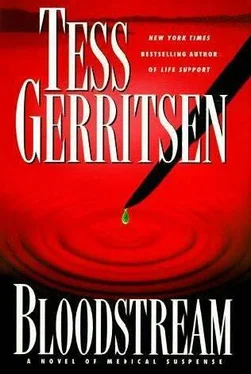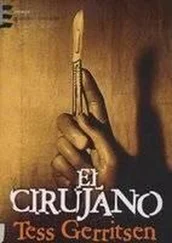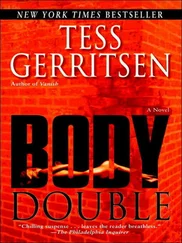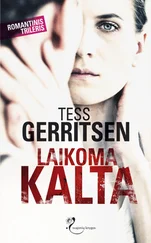“You haven’t done anything wrong?’
“Six years as principal, and suddenly Fm fighting to keep order in my school.
Fighting to keep my job.”
“Fern, I really think it’s just a temporary reaction to the shooting. The kids need time to recover.” He gave her shoulder a reassuring pat and he turned to the door. “It'll pass.”
Once again Claire was staring into Mairead Temple’s mouth. It seemed like familiar territory to her now, the furry tongue, the tonsillar pillars, the uvula hanging down in a quivering flap of pink flesh. And that smell, like an old ashtray, the same smell that permeated Mairead’s kitchen, where they were now sitting. It was Tuesday, the day Claire made house calls, and Mairead was the next to last patient on her schedule. When one’s medical practice is failing, when patients are switching to other doctors, desperate measures are called for. A home visit to Mairead Temple’s smoky kitchen qualified as a desperate measure. Anything to keep a patient happy.
Claire turned off her pen light. “Your throat looks about the same to me. It’s just a little red.”
“Still hurts wicked bad.”
“The culture came back negative.”
“You mean I don’t get any more penicillin?”
“I’m sorry, but I can’t justify it.”
Mairead clacked her dentures together and glared at Claire with pale eyes. “What kinda treatment is that?”
“Well, I’ll tell you, Mairead, the best treatment is prevention.” “So?”
“So Claire eyed the pack of menthol cigarettes lying on the kitchen table. In the advertisements, it was a brand usually associated with slim sophisticates, women in slinky gowns trailing furs and men. “I think it’s time for you to quit smoking.”
“What’s wrong with penicillin?”
Claire ignored the question, turning her attention instead to the wood-burning stove in the center of the overheated kitchen. “That’s not good for your throat, either. It dries out the air and fills it with smoke and irritants. You do have an oil furnace, don’t you?”
“Wood’s cheaper.”
“You’d feel better.”
“I get the wood free, from my nephew.”
“All right,” sighed Claire. “So how about just quitting the cigarettes?” “How about the penicillin?”
They looked at each other, budding enemies over a handful of three-buck pills.
In the end, Claire surrendered. She didn’t have the stamina for an argument this late in the afternoon, not with someone as mulish as Mairead Temple. Just this once was what she told herself as she rummaged for the appropriate antibiotic samples.
Mairead crossed to the woodstove and threw in another log. Smoke puffed out, adding to the general haze hanging over the room.
Even Claire’s throat was beginning to feel sore.
Mairead picked up a pair of tongs and poked at the logs on the fire. “I heard more talk about those bones,” she said.
Claire was still counting out sample tablets. Only when she looked up did she see Mairead was studying her, eyes strangely alert. Feral.
Mairead turned and slapped the stove’s cast-iron door shut. “Old bones, that’s what I heard.”
“Yes, they are.”
“How old?” The pale eyes were once again locked on hers.
“A hundred years, maybe more.”
“They sure about that?”
“I believe they’re quite sure. Why?”
The unsettling gaze slid away from hers again. “You never know what goes on around these parts. No big surprise they found the bones on her property. You know what she is, don’t you? She’s not the only one around here, either. Last Halloween, they lit themselves a big bonfire, over in Warren Emerson’s cornfield. That Emerson, he’s another one.”
“Another what?”
“What do you call ‘em when they’re men? A warlock.”
Claire burst out laughing. It was the wrong thing to do.
“You go ask around town,” insisted Mairead, now angry “They’ll all tell you there was a bonfire up in Emerson’s field that night. And right afterwards, those kids caused all that trouble in town.”
“It happens everywhere. Kids always get rowdy on Halloween.”
“It’s their holy night. Their black Christmas.”
Looking into the other woman’s eyes, Claire realized she didn’t like Mairead Temple. “Everyone is entitled to their beliefs. As long as no one gets hurt.”
“Well, that’s the question, isn’t it? We just don’t know. Look what’s happened around here since then.”
Abruptly Claire shut her medical bag and stood up. “Rachel Sorkin minds her own business, Mairead. I think everyone else in this town should do likewise.”
The bones again, thought Claire as she drove to her last house call of the day.
Everyone wants to know about the bones. Whom they belonged to, when they were buried. And today a new question, one that had taken her by surprise: why were they found in Rachel Sorkin’s yard.
It’s their holy night, their black Christmas.
In Mairead’s kitchen, Claire had laughed. Now, driving through the deepening gloom, she found nothing humorous about the conversation. Rachel Sorkin was the outsider, the black-haired woman from away who lived alone by the lake. That’s how it had always been through the ages; the young woman alone was an object of suspicion, the subject of gossip. In a small town she is the anomaly that requires explanation. She is the town siren, the irresistible temptation for otherwise virtuous husbands. Or she is the shrew no man wants to marry or the twisted female with unnatural desires. And if one is also attractive, like Rachel, or exotic, or peculiar of taste and whim, then suspicion is mixed with fascination. Fascination which could turn to obsession for someone like Mairead Temple, who brooded all day in her grim kitchen, smoking cigarettes that promised glamour but delivered bronchitis and yellow teeth. Rachel did not have yellow teeth. Rachel was beautiful and unencumbered and a little eccentric.
Rachel must therefore be a witch.
Since Warren Emerson had lit a bonfire in his cornfield on Halloween night, he must be a witch as well.
Though dusk had not yet fallen, Claire turned on her headlights and drew some measure of reassurance from the glow of her dashboard. This time of year, she thought, brings out irrational fears in all of us. And the season hasn’t yet reached its darkest point. As the nights grow longer and the first heavy snows begin to fall, cutting off all access to the outside world, this bleak and lonely landscape becomes our universe. And it’s an unforgiving one, where a patch of black ice, and a night’s bitter cold, can act as both judge and executioner.
She arrived at a rural mailbox labeled “Braxton” and turned onto the dirt road.
Her patient’s house stood surrounded by neglected fields. The clapboards were stripped bare, the wood weathered to silver. On the front porch, half a cord of firewood was stacked up precariously against the crooked railing. It would all come tumbling down one of these days-the railing, the porch, the house itself.
Divorced, forty-one-year-old Faye Braxton, who lived here with her two children, was as structurally unsound as her dwelling. Both her hips had been destroyed by rheumatoid arthritis, and she could not even step out of this dismal home without assistance.
Carrying her medical bag, Claire climbed the steps to the front porch. Only then did she realize something was not right.
It was thirty-five degrees outside, and the front door was open.
She poked her head inside the house and called into the gloom:
“Mrs. Braxton?” She heard a shutter banging in the wind. And she heard something else-the faint patter of footsteps, running in an upstairs room. One of the children?
Claire stepped into the house and closed the door against the cold. No lamps were on, and the fading daylight glowed dimly through thin living room curtains.
Читать дальше
Конец ознакомительного отрывка
Купить книгу












